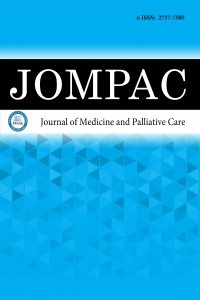1.
Turkish Statistical Information Service [Internet]. Ankara:Turkish Statistical Information Service; 2022 [cited 2022 Aug29]. Available from: https://data.tuik.gov.tr/Bulten/Index?p=Istatistiklerle-Yaslilar-2021-45636#:~:text.
2.
Bray F, Ferlay J, Soerjomataram I, Siegel RL, Torre LA, Jemal A.Global cancer statistics 2018: GLOBOCAN estimates of incidenceand mortality worldwide for 36 cancers in 185 countries. CACancer J Clin. 2018;68(6):394-424.
3.
Eusebi LH, Zagari RM, Bazzoli F. Epidemiology of Helicobacterpylori infection. Helicobacter. 2019;19(1):1-5.
4.
Zhang Z, Pereira SL, Luo M, Matheson EM. Evaluation of bloodbiomarkers associated with risk of malnutrition in older adults:a systematic review and meta-analysis. Nutrients. 2017;9(8):829.
5.
Bittner R, Butters M, Ulrich M, Uppenbrink S, Beger HG. Totalgastrectomy. Updated operative mortality and long-term survivalwith particular reference to patients older than 70 years of age.Ann Surg. 1996;224(1):37-42.
6.
Lee KG, Lee HJ, Yang JY, et al. Risk factors associated withcomplication following gastrectomy for gastric cancer:retrospective analysis of prospectively collected data based on theClavien-Dindo system. J Gastrointest Surg. 2014;18(7):1269-1277.
7.
Persiani R, Antonacci V, Biondi A, et al. Determinants ofsurgical morbidity in gastric cancer treatment. J Am Coll Surg.2008;207(1):13-19.
8.
Dindo D, Demartines N, Clavien PA. Classification of surgicalcomplications: a new proposal with evaluation in a cohort of 6336patients and results of a survey. Ann Surg. 2004;240(2):205-213.
9.
In H, Solsky I, Palis B, Langdon-Embry M, Ajani J, Sano T.Validation of the 8th edition of the AJCC TNM staging systemfor gastric cancer using the national cancer database. Ann SurgOncol. 2017;24(12):3683-91.
10.
Roukos DH, Kappas AM. Perspectives in the treatment of gastriccancer. Nat Clin Pract Oncol. 2005;2(2):98-107.
11.
Cerantola Y, Grass F, Cristaudi A, Demartines N, Schäfer M,Hübner M. Perioperative nutrition in abdominal surgery:recommendations and reality. Gastroenterol Res Pract.2011;2011:739347.
12.
Buzby GP, Mullen JL, Matthews DC, Hobbs CL, Rosato EF.Prognostic nutritional index in gastrointestinal surgery. Am JSurg. 1983;139:160-167.
13.
Onodera T, Goseki N, Kosaki G. Prognostic nutritional index ingastrointestinal surgery of malnourished cancer patients. NipponGeka Gakkai Zasshi. 1984;85(9):1001-1005.
14.
Takagi K, Domagala P, Polak WG, Buettner S, Ijzermans JNM.The controlling nutritional status score and postoperativecomplication risk in gastrointestinal and hepatopancreatobiliarysurgical oncology: a systematic review and meta-analysis. AnnNutr Metab. 2019;74(4):303-312.
15.
Yamanaka T, Matsumoto S, Teramukai S, Ishiwata R, Nagai Y,Fukushima M. The base-line ratio of neutrophils to lymphocytesis as-sociated with patient prognosis in advanced gastric cancer.Oncology. 2007;73(3-4):215-220.
16.
Tanaka H, Muguruma K, Toyokawa T, Kubo N, Ohira M,Hirakawa K. Differential impact of the neutrophil-lymphocyteratio on the survival of patients with stage IV gastric cancer. DigSurg. 2014;31:327-333.
17.
Sakurai K, Ohira M, Tamura T, et al. Predictive potential ofpreoperative nutritional status in long-term outcome projectionsfor patients with gastric cancer. Ann Surg Oncol. 2016;23:525-533.
18.
Wang A, He Z, Cong P, et al. Controlling Nutritional Status(CONUT) Score as a new indicator of prognosis in patients withhilar cholangiocarcinoma is superior to NLR and PNI: A single-center retrospective study. Front Oncol. 2021;10:593452.
19.
Tsujinaka T, Sasako M, Yamamoto S, et al. Influence ofoverweight on surgical complications for gastric cancer: resultsfrom a randomized control trial comparing D2 and extendedpara-aortic D3 lymphadenectomy (JCOG9501). Ann Surg Oncol.2007;14(2):355-361.
20.
Sørensen LT, Hemmingsen U, Kallehave F, et al. Risk factors fortissue and wound complications in gastrointestinal surgery. AnnSurg. 2005;241(4):654-658.
21.
Brem H, Tomic-Canic M. Cellular and molecular basis of woundhealing in diabetes. J Clin Invest. 2007;117(5):1219-1222.
22.
Hanley MJ, Abernethy DR, Greenblatt DJ. Effect of obesity onthe pharmacokinetics of drugs in humans. Clin Pharmacokinet.2010;49(2):71-87.
23.
Kim MG, Yook JH, Kim KC, et al. Influence of obesity on earlysurgical outcomes of laparoscopic-assisted gastrectomy in gastriccancer. Surg Laparosc Endosc Percutan Tech. 2011;21(3):151-154.
24.
Kulig J, Sierzega M, Kolodziejczyk P, et al. Polish Gastric CancerStudy Group. Implications of overweight in gastric cancer: amulticenter study in a western patient population. Eur J SurgOncol. 2010;36(10):969-976.
25.
Hirao M, Tsujinaka T, Imamura H, et al. Osaka gastrointestinalcancer chemotherapy study group (OGSG). Overweight is a riskfactor for surgical site infection following distal gastrectomy forgastric cancer. Gastric Cancer. 2013;16(2):239-244.
26.
Ejaz A, Spolverato G, Kim Y, et al. Impact of body mass indexon perioperative outcomes and survival after resection for gastriccancer. J Surg Res. 2015;195(1):74-82.
27.
Chen HN, Chen XZ, Zhang WH, et al. The impact of body massindex on the surgical outcomes of patients with gastric cancer:a 10-year, single-institution cohort study. Medicine (Baltimore).2015;94(42):e1769.
28.
Bickenbach KA, Denton B, Gonen M, Brennan MF, Coit DG,Strong VE. Impact of obesity on perioperative complicationsand long-term survival of patients with gastric cancer. Ann SurgOncol. 2013;20(3):780-787.
29.
Imai E, Ueda M, Kanao K, et al. Surgical site infection riskfactors identified by multivariate analysis for patient undergoinglaparoscopic, open colon, and gastric surgery. Am J Infect Control.2008;36(10):727-731.
30.
Zhao B, Zhang J, Mei D, et al. Does high body mass indexnegatively affect the surgical outcome and long-term survival ofgastric cancer patients who underwent gastrectomy: a systematicreview and meta-analysis. Eur J Surg Oncol. 2018;44(12):1971-1981.
31.
Bickenbach KA, Denton B, Gonen M, Brennan MF, Coit DG,Strong VE. Impact of obesity on perioperative complicationsand long-term survival of patients with gastric cancer. Ann SurgOncol. 2013;20(3):780-787.
32.
Lee JY, Kim HI, Kim YN, et al. Clinical significance of theprognostic nutritional index for predicting short- and long-term surgical outcomes after gastrectomy: a retrospectiveanalysis of 7781 gastric cancer patients. Medicine (Baltimore).2016;95(18):e3539.
33.
Migita K, Takayama T, Saeki K, et al. The prognostic nutritionalindex predicts long-term outcomes of gastric cancer patientsindependent of tumor stage. Ann Surg Oncol. 2013;20(8):2647-2654.
34.
Tokunaga R, Sakamoto Y, Nakagawa S, et al. Prognosticnutritional index predicts severe complications, recurrence, andpoor prognosis in patients with colorectal cancer undergoingprimary tumor resection. Dis Colon Rectum. 2015;58(11):1048-1057.
35.
Ryo S, Kanda M, Ito S, et al. The controlling nutritional statusscore serves as a predictor of short- and long-term outcomesfor patients with stage 2 or 3 gastric cancer: analysis of a multi-institutional data set. Ann Surg Oncol. 2019; 26(2):456-464.

